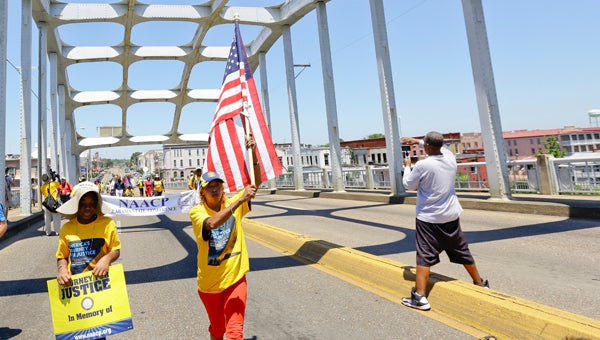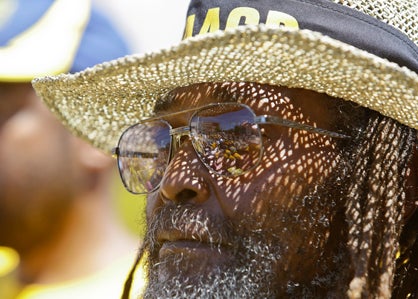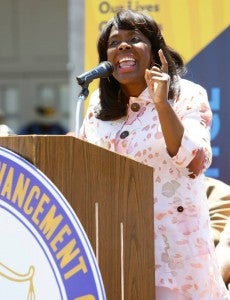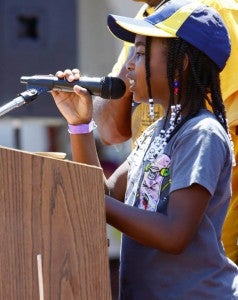March from Selma to Washington underway
Published 3:42 pm Saturday, August 1, 2015

Shirley Gavin Floyd, from Birmingham, carries an American flag at the start of the NAACP march from Selma to Washington D.C. Saturday.
With sunny skies and the Pledge of Allegiance led by Cedar Park third grader Radiance Ransom, the NAACP’s march from Selma to Washington, D.C. got off to a bright start Saturday.
But behind the jubilant mood there was also a serious undertone about the purpose behind “America’s Journey for Justice.”
NAACP president Cornell William Brooks spoke to the marchers, tying current civil rights issues to Selma’s history.
“I’m reminded of a group of pioneers who came together anointed by the call of God 50 years ago … who came to this place knowing they were called by history, called by God, called by their humanity,” Brooks said. “We understand that this many years later we too have been called. That we too are yet moving. We are in fact marching purposely, confidently, gravely and boldly through history at this moment in time.”

Middle Passage, from Colorado, looks on as speakers address those in attendance before the NAACP march from Selma to Washington D.C. Saturday.
Brooks addressed changes to the Voting Rights Act, income inequality and police-involved deaths across the country.

Congress Woman Terri Sewell addresses those in attendance during a program Saturday before the NAACP march from Selma to Washington D.C.
“I know we can make it to Washington, D.C., if foremothers and forefathers did all they did with what little they had, why can’t we do more with all we have been given?” Brooks asked.
Before marchers began their 860-mile trek across five states, several speakers provided motivation for the journey ahead.
State Sen. Hank Sanders spoke about the importance of marching and unity.
“There are a lot of folks that say we don’t need to be marching, but marching is still powerful,” Sanders said. “It was powerful thousands of years ago when Joshua marched … it was powerful in 1965. The thing about marching, singing and praying is that it unifies us. When you march you are not just walking. You are in step together. You are in spirit together. Unity is so powerful.”
U.S. Rep. Terri Sewell welcomed marchers to her hometown and rallied support to an updated version of Voting Rights Act.
In June 2013, the Supreme Court struck down the provision of the Voting Rights Act that required states with past voter discrimination to get Justice Department approval before making any voting changes. The new bill provides a modern formula to determine which states must have federal approval.
“If we are to restore the Voting Rights Act, it will not start in the halls of Congress. It must start here on the streets of America. You must demand that,” Sewell said. “It’s not enough that we had a kumbaya moment here for four months ago. We went back to Washington, D.C., and it was business as usual.”
This weekend’s march drew people from Selma and across the world.
RaSharon King drove down from Bradley County, Tennessee to participate. She also visited Selma for the 50th anniversary of Bloody Sunday earlier this year.
“Since the route doesn’t come through our state, we wanted to be a part of history,” King said. “All of the inequalities that are occurring today — we wanted to be part of the movement to show our support.”
The Suyker family from the Netherlands happened to be passing through Selma on a tour of the American South. The family saw “Selma” earlier this year and wanted to get a first-hand look a history after traveling through Florida and on to Georgia.
“We just ran into this, and we were of course interested in what was going on. They immediately invited us to join,” said Peter Suyker, who was visiting with his wife and two sons. “Just when we arrived, this is happening. It’s pretty cool.”





